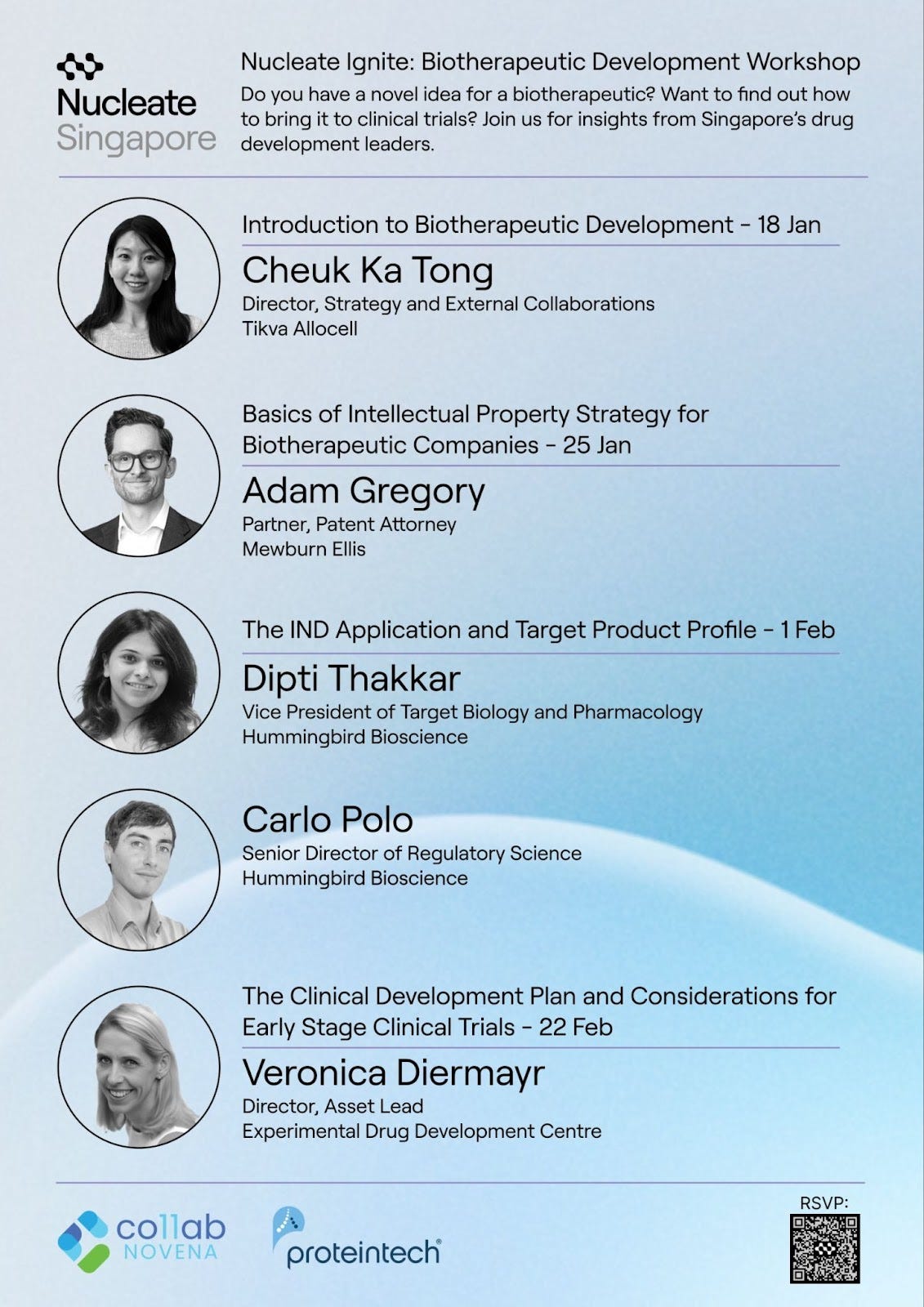The Nucleate Artery: Learn from experts how drugs make its way into the market, and local startups riding on predicted 2024 biotech trends
Plus we speak to Dr Carolyn Ng from venture capital TPG
We are The Nucleate Artery, a monthly newsletter focused on the latest Singaporean biotech research and events. Chat with us via our Slack community: @Liyana Ayub Ow Yong @Leong Kim Whye @Yeow Jiang @Ignacius Tay.
If you enjoyed reading this post, leave a comment and give us a like 👍!
Happy new year to all!
Some news: We are organising a 4-part Biotherapeutic Development Workshop Series in partnership with co11ab over the next few weeks (THANK YOU Proteintech for sponsoring!). If you’re interested to learn more about how a drug makes its way into the market, register here. We hope to see you there!
🍽️ Digestibles
(Research that has been published within the past 2 months)
GENE THERAPY: You can now edit mitochondrial DNA with unprecedented precision
In the fervour of the gene-editing revolution, spurred by the historic approval of Casgevy, the world’s first CRISPR-based medicine by the MHRA and FDA, mitochondrial therapeutics is also making significant strides by adopting a strategy from the CRISPR playbook, incorporating base editing technology for mitochondrial gene editing. Editing genes in the mitochondria is tricky; instead of CRISPR, mtDNA editing is limited to protein-based gene editors only. In the pursuit of developing more precise and targeted protein-based gene editing, Cho et al. engineered novel variants of the A-to-G TALE-linked deaminases (TALEDs). Using these new variants, off-target editing was kept below 40%, a significant improvement from rates as high as 80%! This unprecedented precision overcomes a significant technical hurdle in the creation of models to study mitochondrial diseases and provide new potential in the battle against mitochondrial diseases.
Mitochondrial disease therapeutics:
A comprehensive article from Chemical & Engineering News on mitochondrial DNA editing
BioSpace reporting on the state of mitochondrial diseases therapeutics
Primera Therapeutics launched early last year with a $750M Cellectis partnership working on designer TALE deaminases.
CHRONIC DISEASES: A new model to study Polycystic Kidney Disease (PKD)
Kidney organoids (i.e. miniaturised kidneys) have been around for 20 years now [1], yet these in vitro models have never been studied in vivo. That is, until Liu et al. demonstrated their value in vivo by implanting polycystic kidney disease (PKD) organoids into mice and showing that these organoids can even spontaneously form fluid pockets called cysts to mimic PKD in these mice. Using this brand new model, the team showed that minoxidil, a drug that boosts autophagy (loosely speaking, encouraging cells to eat themselves), effectively reduces new cyst formation by more than 50%. Considering that PKD has no effective cure even today, this new tool represents a step in the right direction for PKD research.
Other developments in kidney therapies:
Kidney disease reported on Channel News Asia as a major concern in Singapore, affecting >10% Singapore residents according to MOH.
Singapore-based startup AWAK Technologies raised >US$20 million in Series B funding in Sep 2023. They offer ultraportable dialysis devices and a comprehensive digital solution for kidney care management.
Software medical device HealthVector Diabetes, offered by local-based healthtech startup Mesh Bio, was approved for clinical use in Oct 2023 to calculate a risk score that can be used to assess kidney health.
BIOMATERIALS: Flowing forward: A bioinspired hydrogel for clean water and sustainable growth
More than a quarter of the global population don’t have easy access to potable water, and more than half lack sanitation services – a problem the UN Sustainable Development Goal 6 (SDG 6) on water and sanitation seeks to tackle. But advances in hydrogel technology offer hope: hydrogels are essentially 3D networks structures that can absorb large amounts of water. In this article, Zhu et al. created an innovative hydrogel inspired by the natural architecture of biological tissues, and showed that it can tolerate fast unidirectional water flow while bearing great mechanical strength. Beyond water purification, this biomaterial has broad applicability in medicine, drug delivery, and even agriculture.
Hydrogel innovations:
InnoGro™ from NUS Environmental Research Institute (NERI) developed a soy-derived super-absorbent hydrogel, with the ability to absorb water to over 150 times its size. Supplementing InnoGro to soil boasted reduction in water wastage by up to 75%.
SmartFarm from NUS Department of Materials Science and Engineering (MSE) developed a solar-powered automated device centralised about a highly-absorbent copper-based hydrogel to absorb air moisture at night when relative humidity is higher, and releases water when exposed to sunlight in the day for agricultural irrigation.
REGENERATIVE MEDICINE: Entropic biocomposite polymer transforms fracture recovery
Osteoporosis (literally meaning porous bones) can be a worrying risk factor for serious bone fractures, especially in ageing societies. Traditionally, serious fractures require rather invasive treatments: a surgery to insert a load-bearing implant to support recovery, and sometimes a subsequent implant-removal surgery after the bone has healed. Furthermore, multiple surgeries can be particularly risky for the elderly. In this paper, Hou et al. address these challenges by leveraging on the forces of entropy (think organised chaos!!) to engineer a biodegradable composite polymer that has both exceptional mechanical strength and biocompatibility. This allows seamless integration into the bone structure as a scaffold to facilitate faster regeneration of damaged bone tissues, opening up a novel area for the development of biocomposite materials for tissue regeneration.
Biopolymeric engineering trends:
Castomize revolutionises fracture care with 4D-printed cast that can be reshaped according to how the bone is healing.
Osteopore Limited is a global regenerative medicine company founded in Singapore, developing implants made of a bioresorbable polymer that heal bone naturally. This reduces post-surgery complication rates significantly, compared to permanent implants.
EPIDEMIOLOGY: Climate change: an opportunity for biotech innovation
In 2023, we saw record high temperatures in the months of May and October and more frequent flash floods from heavy downpours. This will only continue to intensify according to the third National Climate Change Study. In this pioneering review by Aik et al., the authors examined the associations between climate variability, air pollution and population health. The study revealed clear positive associations between higher absolute humidity and certain infectious diseases such as dengue. Specific air pollutants were also linked to increased risk of stroke. Despite not being covered in this particular study, associations between climate change and chronic diseases would also be interesting to track. Chronic diseases in Singapore have been a concern to the local government [2] and insurance giants [3] because of its toll on population health (16.3% of the Singapore population have >1 chronic condition [4]). In addition to government policies, there may be an opportunity to leverage biotechnology to develop innovative solutions for more effective mitigation of climate change impacts on chronic conditions.
Climate change is a real world problem:
One of the three highlighted predictions for chronic disease narratives to watch in 2024 on STAT revolves around the impact of climate change.
Data collection practices when monitoring chronic diseases play an important role in supporting technology development
🎧 Nucleate Singapore Pulse
This month, we interviewed Dr. Carolyn Ng, Partner and Managing Director at TPG Life Sciences Innovation. She breaks down her evaluation strategy for potential biotech investments, honed over many years of experience, and how one can find silver linings in the face of macroeconomic headwinds. Listen to her insights on startup success factors and savvy exit strategies for biotech companies.
View show notes and transcript
📆 Events happening this month
IP
Intellectual Property (IP) Clinic | NUS TTI
(16 Jan, 2:00 PM - 5:00 PM, in person at Singapore 117599)
Workshops
Nucleate Ignite: Introduction to Biotherapeutic Development | Nucleate SG 🥳
(18 Jan, 5:30 PM - 8:30 PM, in person at Singapore 308232)
Generative AI Accelerate Launch Information Session (Singapore) | BLOCK71
(23 Jan, 2:30 PM - 5:00 PM, in person at Singapore 139951)
Nucleate Ignite: Basics of Intellectual Property Strategy for Biotherapeutic Companies | Nucleate SG 🥳
(25 Jan, 5:30 PM - 8:30 PM, in person at Singapore 308232)
Nucleate Ignite: The IND Application and Target Product Profile | Nucleate SG 🥳
(1 Feb 5:30 PM - 8:30 PM, in person at Singapore 308232)
(22 Feb 5:30 PM - 8:30 PM, in person at Singapore 308232)
Others
Flavours of Tomorrow Food Festival | SGInnovate
(20 Jan - 21 Jan, in person at Singapore 117674)
Azenta SPARK 2024 | Azenta Life Sciences
(6 Nov 2023 - 28 Feb 2024)









